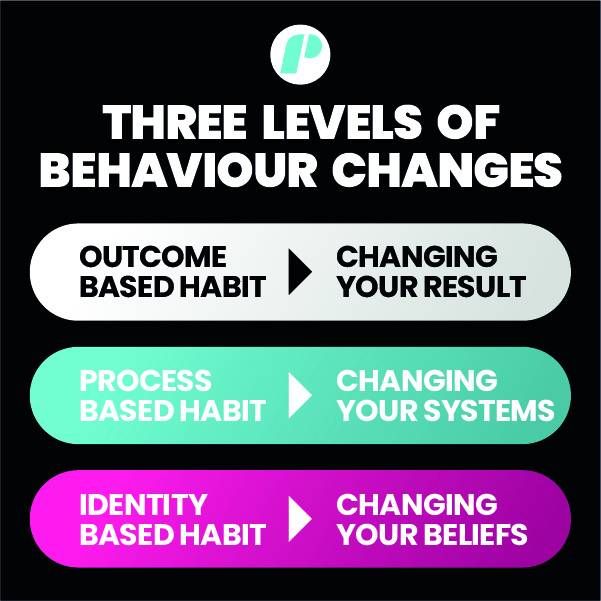
A habit is a routine behavior that is repeated regularly. According to James Clear’s book, The Atomic Habits, there is a popular saying that tiny changes can make a big difference. Hence, as a trader, trading habits you pick up as you advance in your journey, or ones you learn consciously, can either make or break you. We are often consumed with the idea that we need to take massive action to see a massive change. But in reality, this isn’t always the case. One can easily overestimate the power of a defining moment and underestimate the value of making small changes towards it.
Improving yourself by 1% daily might not be notable. But, it will give a significant result as time passes. Do not underestimate the power of compounding! You can also relate this to trading. It would help if you had the right trading habit to make real progress as a trader.
This article will teach you how to develop a good trading habit. Generally, this article is based on the book The Atomic Habits by James Clear. So, whether you have read the book or not, you can be sure to pick up some helpful habit tips. Let’s explore more.
Why do we need to cultivate good trading habits?
One thing to note about behavior changes is that they can occur on three levels; outcome, process, and identity. An outcome-based habit is concerned with changing your result. Process-based habit is concerned with changing your systems and habits. In comparison, an identity-based habit is concerned with changing your beliefs.

Our habits can shape our identity and vice versa. Hence, it is important to develop a good habit. However, it is much easier to repeat bad habits but hard to form good ones. This is because people use the wrong approach to change bad habits.
Becoming a better version of yourself requires you to expand your identity, which has several benefits continuously. The most effective way to change your habit is to focus on whom you wish to become and not on what you want to achieve.
Below are some of the benefits of having a good habit.
Habits can replace motivation
Everyone has days when they don’t feel like working or exercising. On such days, motivation alone wouldn’t be enough. On such days, a person who has developed a good habit will find themself doing it anyway without thinking about it. The reason is that building a habit is like second nature. Living off a good habit rather than motivation will greatly benefit you for the rest of your life.
Habits form the foundation for life
Another important reason for developing a good habit is that it forms the foundation of life. Your habits end up becoming you, whether it is a good or a bad habit. What this means is that your habits set the tone for which your entire life will follow. This isn’t to say that we are only our habits; rather, they play a vital role in making sense of who we are.
For example, if you develop a habit of eating healthy and exercising regularly, you will have a healthier lifestyle. Hence, since whatever habit we build influences our life, it is important to develop a good one.
Good habits are compounding
The effects habits have on our lives are compounding. While you may do something once or twice without much effect, making it a habit will have a sizable impact in time. For example, if you make it a habit to practice something every day, you will see a significant difference in results between the first day you start and months later. As long as you do it regularly, anything you do will have a compounding effect. Small changes daily may go unnoticed, but their result is quite considerable in the long run.
Habits help accomplish long-term goals
Having goals you want to achieve helps you stay focused. But sometimes, achieving your goals can seem impossible, especially long-term goals. Achieving such goals takes time, but this often discourages most people, especially when they think about the massive task ahead.
While the effort to do something big may seem daunting, splitting it up into daily or regular tasks will help you accomplish it easily. So, getting yourself into the habit of making an effort to do those small daily tasks will make what seems impossible more manageable.
Good trading habits help you better manage time
If you are the type who often procrastinates on tasks and pushes them off, developing a good habit can help you better manage your time. If you have a good habit, what normally takes you an hour to complete, could take 30 minutes or less, depending on the nature of the task.
When you have developed a good habit, it no longer becomes something you can avoid because it has become a part of you. So, you don’t need to convince yourself to do it because it has become a part of your routine.
Problems you might face developing good trading habits
As you can tell by now, developing a good habit has several benefits. Many people don’t often see positive results when trying to develop a habit because of how they are trying to do it. And according to research, developing a habit takes time and can be difficult.
Below we look at some common mistakes/problems with developing a good habit.
Not starting small
Often, people are inspired to develop a good habit based on a set goal or desire to achieve something. While this is a great motivation, many people often want to start with big steps. Hence, they get so overwhelmed that it deters their journey to develop a good habit.
The trick to developing a good habit is to go at a steady pace. In other words, if one can afford to make small changes regularly, it is better in the long run than making big changes without consistency. So, if you truly want to develop that habit, ask yourself the smallest steps you can take to help you get the habit going every time.
Not relating your habit to your unique why
When developing a habit, there is more to it than simply knowing what you want to develop. You have to know the generic reason why you want it. Many people often mistake not recognizing their unique “why” they are developing habits.
Recognizing a personal reason you want to develop a habit helps you focus better, overcome obstacles, or be more consistent. For example, you may want to develop the habit of reading more because it enlightens you. But it would be more powerful and motivating if you consider a specific reason, like reading more because you want to learn how to trade better.
Having the wrong goal mindset
It is great to have goals when trying to develop good trading habits, but it is essential not to be too goal-oriented. Goals are only a momentary change. For example, if you set a goal to clean your room and then summon the energy to clean it but still maintain the sloppy tidiness habit, you will end up with a messy room in no time.
Setting goals creates an “either-or” conflict: you either achieve the goal or you fail. Many people think they need to change their results, but results are not the problem. What needs to be changed is the system that caused the problem in the first place.
Not tracking progress
As we said earlier, setting goals is great when developing a habit because they help you keep track of your progress. Because of the considerable time, patience, energy, persistence, and other resources that go into developing a good habit, keeping track of your progress can help motivate you.
No one wants to put effort into something with no result. Tracking your habit’s progress can help you tweak it to make it easier, enjoyable, and exciting to maintain.
When you don’t have an accountability system in place
Another mistake many people make when developing a habit is not having an accountability system. The same way students submit their homework to get graded, you always need to have a system that helps you stay on track. An accountability system enables you to keep on track and be committed to putting more effort into the habit development process.
You can increase accountability in several ways, such as getting a partner involved, joining a support group, establishing rewards or setting up a consequence, and so on. Without an accountability system, it becomes easy to be swayed off your habit path and give in to temptation and procrastination.
Environment impact
Many people fail to see this, but the environment in which you try to develop a habit can significantly impact your progress. Even if you are determined, if the environment is not favorable, there is a high chance of multiple relapses. For example, if you are trying to read more but are surrounded by distractions such as TV, video games, social media apps, and so on, chances are you would soon drop the book and engage in another activity.
For this reason, it helps to consider your environment and find a way to eliminate/manage any external factor that would deter you from developing your habits.
When you are not in it for the long-term progress
Unfortunately, many people make the mistake of giving up on a habit before it is fully developed. The reason is that they go full force at it for the first few weeks, then give up when they don’t get the expected results. They fail to realize that developing a habit is a long-term process you can’t attain with short-term thinking. But when you reframe your mindset to be in it for the long haul, you will be less prone to make excuses.
Developing habits with a long-term mindset will also make you more resilient to face challenges and be more problem-oriented and solution-oriented.
Good trading habits every successful trader needs
Trading habits are those actions you do consistently whenever you’re trading. As a trader, you must consciously imbibe good trading habits to succeed. No trader is born a good trader.
So, if you want to become a successful trader, here are key habits that can help you achieve your goals and keep you afloat in the business:
Discipline
Discipline is a habit that can help you in any industry, including trading. As a trader, be it long-term or short-term, you need to have a plan that you must stick to unless you have a good reason not to. You can use several trading strategies, but jumping from one to another is not a way to go.
Risk management
As a trader, you need to know how to manage risk better. Trading is risky, and there is a high chance of losing a huge percentage of your capital if you don’t know how to manage risk. A good trader does not get obsessed with returns. Instead, they focus on the aspect of the market they can control.
Realistic expectation
Being optimistic is a trading habit that can help you make a lot of successful trades. While being an optimistic trader, you also need to keep your expectations grounded and realistic. There are days the market will favor you, and it could also go the other way sometimes.
Having the right expectation can help you control your emotions and make the right decision as a trader. Because when you are not prepared for a loss, and you lose money, it can make you emotionally take trades to recover lost funds, which can further increase the loss.
Patience and persistence
Every trader needs to be patient and persist as they will make a lot of bad and good trades. Hence, if you want to be a good trader, you need to be willing to learn from your mistakes continuously. Smart traders usually grasp when they are wrong and are pragmatic enough to accept and move on.
How do you implement “Atomic Habits” rules to build good trading habits?
The book Atomic Habits contains helpful information you can apply to develop good trading habits. The process of developing a habit, be it trading or other things in life, can be grouped into four stages: cue, craving, response, and reward. This means that a cue triggers a craving that motivates a response and provides a reward.
So, if you would like to develop a good trading habit, then the following steps explain how you can go about it.
Step 1: Make it obvious
One of the greatest challenges people face with changing or developing a habit is maintaining awareness of what they are doing. This explains why sometimes a bad habit can sneak up on us. The process of behavioral change always begins with awareness. As a trader, the more aware you are of your decisions, the better you’d become at getting results.
You can leverage the Pointing-and-Calling system to make a trading decision more obvious. The Pointing-and-Calling system is so effective because it raises awareness from an unconscious habit to a more conscious level.
It is also worth noting that behavioral automation is not entirely wrong. Think about it for a second; when you do something repeatedly, the more automatic the behavior will become. Hence, the less likely you will be to think about it. And when things become automatic, we tend to overlook details because we assume the next time will be like the last time. It becomes a part of us that we stop to question whether it is right or not.
Many of our failures are largely attributed to a lack of self-awareness. That is why it makes much sense to use the Pointing-and-Calling system because it is more like a scorecard but for behavior.
Step 2: Make it attractive
The next step to developing a good trading habit is to make it attractive. The truth is that the more attractive a behavioral change is, the more likely it is to become a habit. Developing a good habit has a lot to do with the dopamine level in the brain. Dopamine is a neuromodulatory molecule in the brain responsible for the sense of pleasure.
For example, as a trader, if, after reading more about how to trade, you’re able to come up with a strategy that helps you make a profit, then you will be more motivated to read more. The reason for this is the anticipation of a reward, not the fulfillment, that gets one to take action. Hence, the greater the anticipation, the greater the dopamine spike in the brain.
A smart way of making your trading habits more attractive is temptation bundling. This strategy involves pairing an action you want to do with an action you need to do.
Step 3: Make it easy
Developing a good trading habit is not easy. However, if there were a way to make it easy, then things would be more appealing. When developing a habit, it gets easier each time you repeat it.
The most effective way to develop a habit is through practice, not planning. So, it would help if you were more focused on taking actions that are not in motion. Based on the habit you are trying to build, assess areas you are not building on and work out a rate at which you can perform them.
When developing a habit, it is not about how long it takes for the habit to become automatic. Instead, what matters is that you take the right actions to help you make progress. Whether the action is fully automatic or not is less important. To build the habit, you need to practice it to become easier. Hence, the more time you spend performing a habit is not as important as the times you perform it.
Think of it this way: It is better to spend an hour developing a habit for ten days than to spend 10 hours a day developing a habit for ten days.
Step 4: Make it satisfying
Finally, the more satisfied you are at developing trading habits, the better your chances of it sticking with you for a very long time. Ideally, an individual will choose a path that rewards an action in a few weeks over a path that rewards an action in months or years. This is because the human brain prioritizes immediate rewards over delayed ones. This proves the Cardinal Rule of Behavior Changes that states that what is immediately rewarded is repeated, and what is immediately punished is avoided.
So, to get a habit that sticks, one has to feel immediately successful, even if it is in a small way. As a trader, it helps to make small moves you can measure.
Intrinsic rewards like better mood, reduced stress, more energy, and so on make you less concerned with chasing a secondary reward. If you are not enjoying any part of a habit you are trying to develop, then the odds are against you that the habit will last. And the more a habit becomes a part of you, the less likely you will need to source outside encouragement or motivation to follow through.
Conclusion
Developing a good habit takes time, and the only way to claim the reward is if you are patient. According to Atomic Habits by James Clear, you will learn that making an action obvious, attractive and easy increases the possibility that a behavior will be performed at a particular time, and the four-step of making an action satisfying increases the odds of the behavior being repeated next time.
Little things like incentives can help you start building a good habit, but your identity is what helps you sustain a good habit.
If you liked this post make sure to share it!





